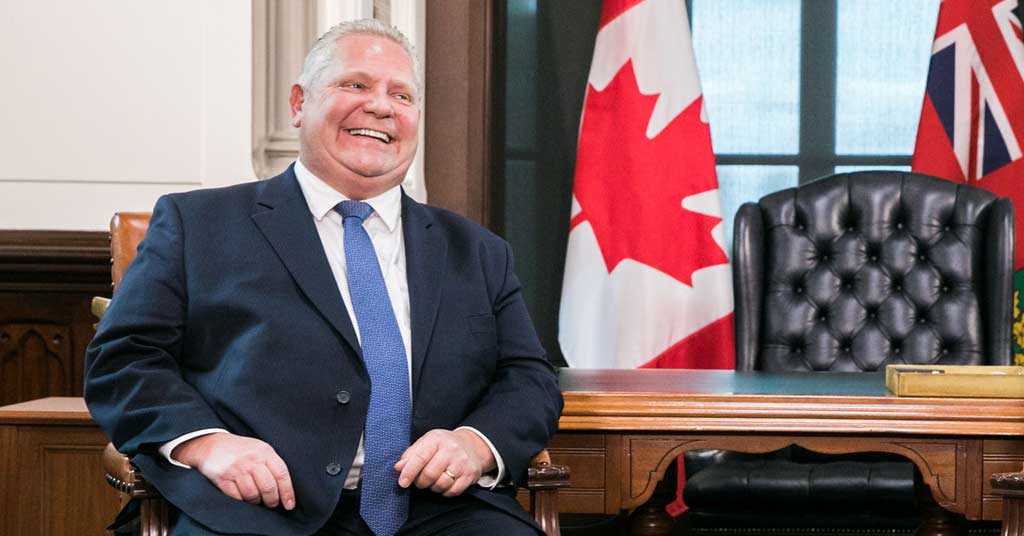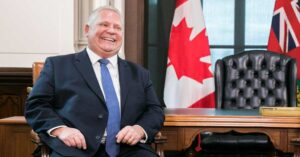
Emergencies Act Inquiry Points Blame at Doug Ford’s ‘Absence’ During Ottawa Convoy Occupation
Emergencies Act Inquiry concludes that Freedom Convoy chaos was a ‘failure in federalism’
The public inquiry into the federal government’s decision to invoke the Emergencies Act has concluded that the federal government’s “very high threshold for invocation was met” and finds Doug Ford’s “absence” during the convoy made the situation significantly worse.
“The decision to invoke the Act was appropriate,” Paul Rouleau, Commissioner of the Public Order Emergency Commission concludes in the Inquiry’s final report — though Rouleau notes it never should have come to that.
“The state should generally be able to respond to circumstances of urgency without the use of emergency powers,” Rouleau states. “It is regrettable that such a situation arose here, because in my view, it could have been avoided.”
“It was the failure to anticipate such a moment and to properly manage the legitimate protests that emerged, especially the protest in Ottawa, that resulted in the 2022 Public Order Emergency.”
While the report finds the “breakdown in order and and social norms” in the streets of Ottawa was caused by numerous “failures” and a “general breakdown of command and control” at Ottawa Police, Rouleau finds another significant factor was the “absence of provincial engagement at the political level” from Ontario Premier Doug Ford’s government.
“The failures were not only in policing. The events of January and February 2022 can also be seen as a failure of federalism.”
“I recognize that Ottawa is a uniquely complex city from a jurisdictional perspective, given the multiple levels of government that operate there,” Rouleau concedes, but adds that “this does not change the fact that Ottawa is a municipality created by the province of Ontario and subject to its jurisdiction.”
“The Province is ultimately responsible for effective policing in Ottawa. Given that the City and its police services were clearly overwhelmed, it was incumbent on the Province to become visibly, publicly, and wholeheartedly engaged from the outset.”
“One theme that emerged during the Inquiry was the view that the Government of Ontario was not fully engaged in responding to the protests.” Rouleau points out “many witnesses saw the Province as trying to avoid responsibility for responding to a crisis within its borders.”
“I find the province of Ontario’s reluctance to become fully engaged with such efforts directed at resolving the situation in Ottawa troubling.”
Rouleau’s report concludes that a lack of “collaboration” between Doug Ford and Prime Minister Justin Trudeau as a big contributing factor in enabling the convoy to spiral out of control.
“Had there been greater collaboration at the political level from the start, it could well have assisted in ironing out the communication, jurisdictional and resourcing issues that plagued the early response to the protests,” Rouleau’s report states. “It also could have assisted in identifying authorities available to each level of government that might have been used to respond to the protests and coordinate direct engagement with protestors.”
“It also could have provided the people of Ottawa with a clear message that they had not been abandoned by their provincial government during a time of crisis.”
The Public Order Emergency Commission’s final report includes a number of recommendations aimed at making the Province of Ontario’s roles and responsibilities over policing clearer in emergency or major event situations.
Ultimately, Rouleau concedes he was at a “regrettable disadvantage” in “understanding Ontario’s perspective” because Ford refused to comply with a summons to testify at the Inquiry.
“Both Premier Doug Ford and Solicitor General Sylvia Jones refused to be interviewed by Commission counsel. When I issued summonses to compel their testimony, they invoked Parliamentary privilege and refused to comply.”
The Public Order Emergency Commission was triggered automatically under legislation to review the decision to invoke the Emergencies Act. It was mandated to “examine and assess” the government’s decision to invoke the emergency powers.
Our journalism is powered by readers like you.
We’re an award-winning non-profit news organization that covers topics like social and economic inequality, big business and labour, and right-wing extremism.
Help us build so we can bring to light stories that don’t get the attention they deserve from Canada’s big corporate media outlets.
Donate



